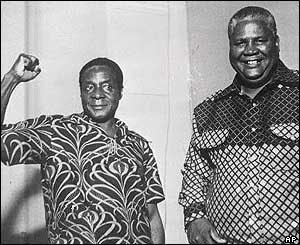Globalisation, a debatable reality viewed by some critics with contempt, as a sinister intention to create a global ruling class governed by first world nations, and imposed upon us as a version of imperialism in postcolonial Africa.
Swimming against this tide cannot constitute a proper development agenda for Africa, but harnessing the opportunities that come with globalizations remains a viable option, and globalization like the rise of the knowledgeable worker, has in it a future shock to those nations that remain unprepared for it.
As for the strenuous journey of Africa to development, it is inescapable to blame developed nations for the brain drain, while the motherland is engulfed in a scourge of poverty. We should ask ourselves what strategies should we implement to be able to harvest from globalization, in the face of brain drain?
Globalisation comes with it the free flow of factors of production, among them the contentious issue of brain drain (Skilled labour emigration), which has been negatively interpreted by most postcolonial economic planners.
The African Union has defined the African Diaspora as "consisting of people of African origin living outside the continent, irrespective of their citizenship and nationality and who are willing to contribute to the development of the continent and the building of the African Union".
Its constitutive act declares that it shall "invite and encourage the full participation of the African Diaspora as an important part of our Continent, in the building of the African Union".
In much of postcolonial Africa brain drain has been negatively viewed as the sinister poaching of scarce skills by developed nations, a euphemism for the "accumulation strategies of international capital" of developed nations, the North of America, Australia and Western Europe.
Concern is that the sending countries will lose out in form of scarce skills (Doctors, Teachers, Engineers and other highly educated professionals), lose of taxpayer's money invested in educating and mentoring the emigrating professionals. In Zimbabwe the movement of people (Zimbabwean Diaspora) fleeing the economic and political disaster has from the state point of view been projected as a security threat.
Hence the reluctance by government to allow them to participate in the March 2008 general election. The state has proved beyond reasonable doubt that it views suspiciously, the Diaspora as source of political competition and to some extent economic competition.
Viewing our economy as a victim of the West has inspired policing in Postcolonial Zimbabwe, therefore all policies must be meant to counter foreign threats including the threats from Zimbabweans abroad, seen as working against the ruling party.
What has been ignored is that the Diaspora is a critical element of the development programme of any successful nation; history is littered with examples of nations that harvested from integrating Diasporas in economic planning and programmes; Mexico, China, Korea, Taiwan, India and the USA are few outstanding examples.
We have been our own enemies in failing to locate this historical reality as part of the broader set of solutions to our economic crisis; instead the government has sought to project patriotism as starving and enduring the economic and political collapse.
The deportations of sons and daughter of the ruling elite and cronies from Australia should help to instill the real sense among my countryman who have been swayed by this propaganda that learning and working abroad is sinister and being non-patriotic. At least the Australians action vindicates this pretence by government.
Orozco (2003) articulates, the Diasporas as beneficial to the receiving country through a mnemonic, the 5 T's, implying the beneficial effects in Transport, tourism, trade, Telecommunications and Transmission of remittances. Johnson and Sedaca (2004) also put an in-depth that Diasporas take part in knowledge transfer, investment instruments and business investments.
Transport is boosted, in particular the air, road and rail transport as Zimbabweans domiciled in foreign nations travel to and from Zimbabwe, mostly the majority of them visit during public holidays. The visits also accompany with it tourism, as the returnees will have come home for holidaymaking and visiting relatives.
Zimbabweans in foreign lands also act as ambassadors of the Zimbabwean brand, dependable of whether their conduct can amount to supporting or demeaning the brand. Therefore the Diaspora can be interpreted as political and socio-economic ambassadors.
When they part with their relatives, emigrants want to maintain their social and business ties, so the telecommunications industry gets a boom in telephone calls and Internet revenue from the charges.
Trade is boosted through a network of ties which are developed for example the Indians in the USA act as middlemen's in outsourcing IT requirements for their countrymen, this helps to instill confidents in transactions, thus enhancing trade.
The transmission of remittances is also another obvious oversold benefit of foreign flow of revenue for consumption and investments purposes.
Zimbabwe cannot avoid missing the opportunities of harnessing the Diaspora component in economic recovery, if it is to meet its development agenda.
A post crisis era should encourage the returnees to return back to their motherland and invest in their country through various initiatives among them; creating high interest foreign currency bonds specifically for the Diaspora, and tax exemptions for those bringing industrial equipment and machinery (this paid dividends in China and Pakistan).
Encouraging entrepreneurship should be a priority because the Diasporas have the advantage of huge savings as compared to locals and their competitive edge is a specialized skill and exposure to advanced technologies. The post crisis government should encourage the formation of hometown associations e.g. Harare-SA association as vehicles for investments and networking.
Above all we should secure an economy which values private property rights (land ownership titles should become a market commodity) through a court protection underpinned by an independent judiciary, the Diasporas must be presented as compatriots, and a free contestation of opinions must prevail as a market of ideas.
The state has no strategic capacity to remain with management functions of the economy; it should dispose public entities targeting the Diaspora, and remain with a few strategic public utilities such as ZINWA and National Railways, which should instead be commercialized.
The state should retain a regulatory, coordinating and accountable role in the management process of the economy; by setting the rules of the game and ensuring that there are respected by all. Trampling on private property rights and other economic subjects should become a treasonable offence.
This will allow Zimbabwe to speak the same language in the international business circles while ushering in a middle class composed of entrepreneurs, which are a more stable element and ardent supporter of the development of the country.
The lessons of the harsh legacy that Zimbabwe has received should collectively unite us on a vision for the love our motherland, through the theme "no more abuse of us beyond March 2008".
References
Johnson, Brett and Santiago Sedaca (2004). "Diasporas, Émigrés and Development: Economic Linkages and Programmatic Responses," Study conducted under the Trade Enhancement Service Sector (TESS) Project under Contract for the U.S. Agency for International Development, Washington, D.C.: Carana Corporation, January 2004.
Orozco, Manuel (2003). "The Impact of Migration in the Caribbean and Central American Region," Focal Policy Paper FPP-03-03, Ottawa, Ontario: Canadian Foundation for the Americas.
Hillary Kundishora is a Scholar of Strategic management. He can be contacted on hkundishora@yahoo.co.uk and zimchaiyo.blogspot.com.
Support the World Aids Awareness campaign this month with Yahoo! for Good












No comments:
Post a Comment